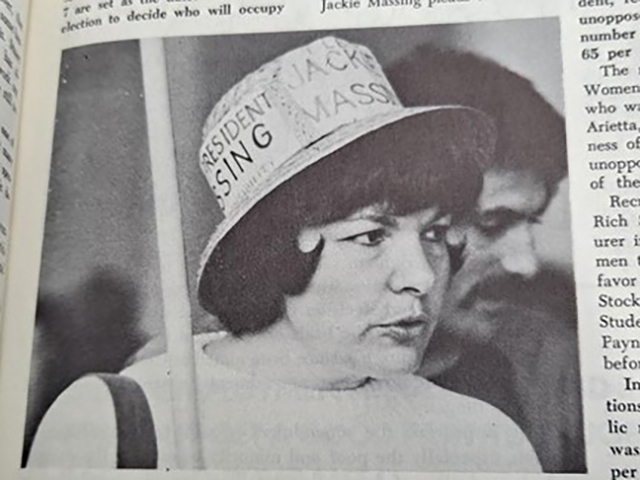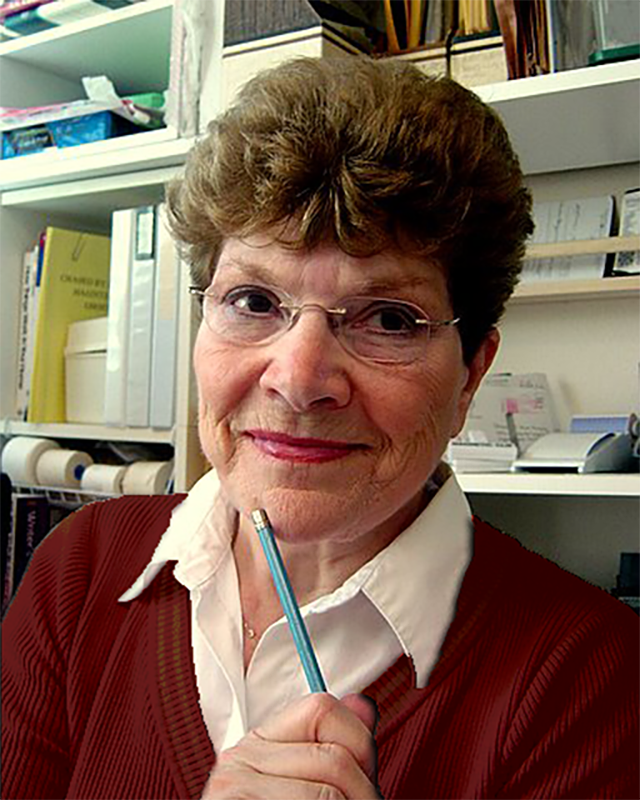Jacqueline Grossman Massing (Class of 1976)
Holocaust survivor and escapee from Nazi-occupied France
Student body president, 1975
Activist for affordable child care on campus
When Jackie Massing ran for CSM student body president in 1974 to obtain on-campus childcare for student parents, her male opponent labeled her old, unrepresentative and a tool of “special-interest fanaticism.”
Massing, a re-entry student, passionate feminist, mother of three and shrewd politician, won that battle—not just the election, but the larger cause she fought for. Her tireless advocacy and activism put childcare on the CSM agenda and led eventually to the 1981 opening of the Mary Meta Lazarus Child Development Center that thrives today.
The 1970s feminist movement encouraged women like Massing to rethink traditional roles as homemakers and to seek higher education. A CSM re-entry program helped such women to navigate community college and to plan their next steps.
Massing liked to call herself “traditional”— once, she said, her father punished her for parachuting off the roof with an umbrella—but she was anything but.
Born in Paris in 1931, she was the daughter of a Jewish operative in the French Resistance against Nazi Germany. In 1941, Massing’s father arranged for Jackie and her two younger sisters to be smuggled out of Nazi-occupied Paris to a village near the Spanish border. There, a villager hid the little girls in her cellar until a shepherd could escort them to safety. Refugee workers sent the girls to Ohio, where they lived in foster care until their parents joined them. Not until her 70s, Massing says, was she able to process the trauma of her Holocaust years and how they shaped her life and causes.
Marrying a dermatologist, Massing moved to the Bay Area and threw her energies into her family and volunteering. She co-founded a nonprofit to support the Hillbarn Theatre, which was affiliated with CSM until the late 1970s.
“After the excitement and effort of raising all that money for the theatre, there was a big letdown,” she said. “I was back to being Mrs. Massing with no identity of my own—I wanted my own name.”


Entering CSM in 1972, Massing observed many fellow students were handicapped by not having affordable childcare. Massing saw this as an equity issue. “The absence of childcare sentences all too many women to a life of poverty,” she said. As such, it needed societal and not just individual solutions.
In 1974, she and other women set up a volunteer childcare cooperative in an unused room near the CSM cafeteria. Massing conducted polls, raised funds, lobbied elected officials and brought 200 CSM women into a district Board of Trustees meeting to demand permanent, professional and affordable childcare on campus. She leveraged her contacts in the League of Women Voters, the AAUW and the American Federation of Teachers, which all endorsed the idea.
Skyline College’s president spoke against such a center, protesting it would cost $60,000 a year to accommodate 25 kids. Massing responded: “Interestingly, just this month, our trustees spent $55,000 for new tennis courts without wincing.”
Eventually, the childcare advocates sued the college district under federal Title IX. Losing at the trial level, they appealed to the U.S. District Court of Appeals, which found in their favor. Wrote Judge Edmund Louis Palmieri for the majority:
“Plaintiffs and the class they represent are thus being deprived of their right of access to educational opportunities on the basis of sex in that the lack of child care facilities is a burden which falls almost exclusively on women and prevents women from participating in and denies them the benefits of educational programs in the District ... (I)t cannot be said as a matter of law that plaintiffs would be entitled to no relief under Title IX upon proof of their allegations.”
College President Lois Callahan sought a way to move forward. One of Massing’s near-contemporaries was Mary Meta Lazarus, another CSM re-entry student who believed passionately in childcare as an equity issue. After Lazarus’ sudden death in 1978, her family honored her memory with a $500,000 gift that established the Mary Meta Lazarus Child Development Center on campus.
Massing continued her education, earning several degrees in art and psychology. She wrote a memoir of her Holocaust years. When her husband, Alan, was diagnosed with Parkinson’s, Massing founded a nonprofit gym, PEP4U, where Parkinson’s patients can exercise. She lives in Laguna Woods.

